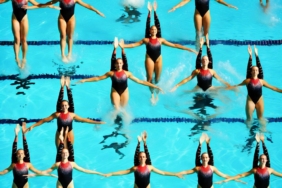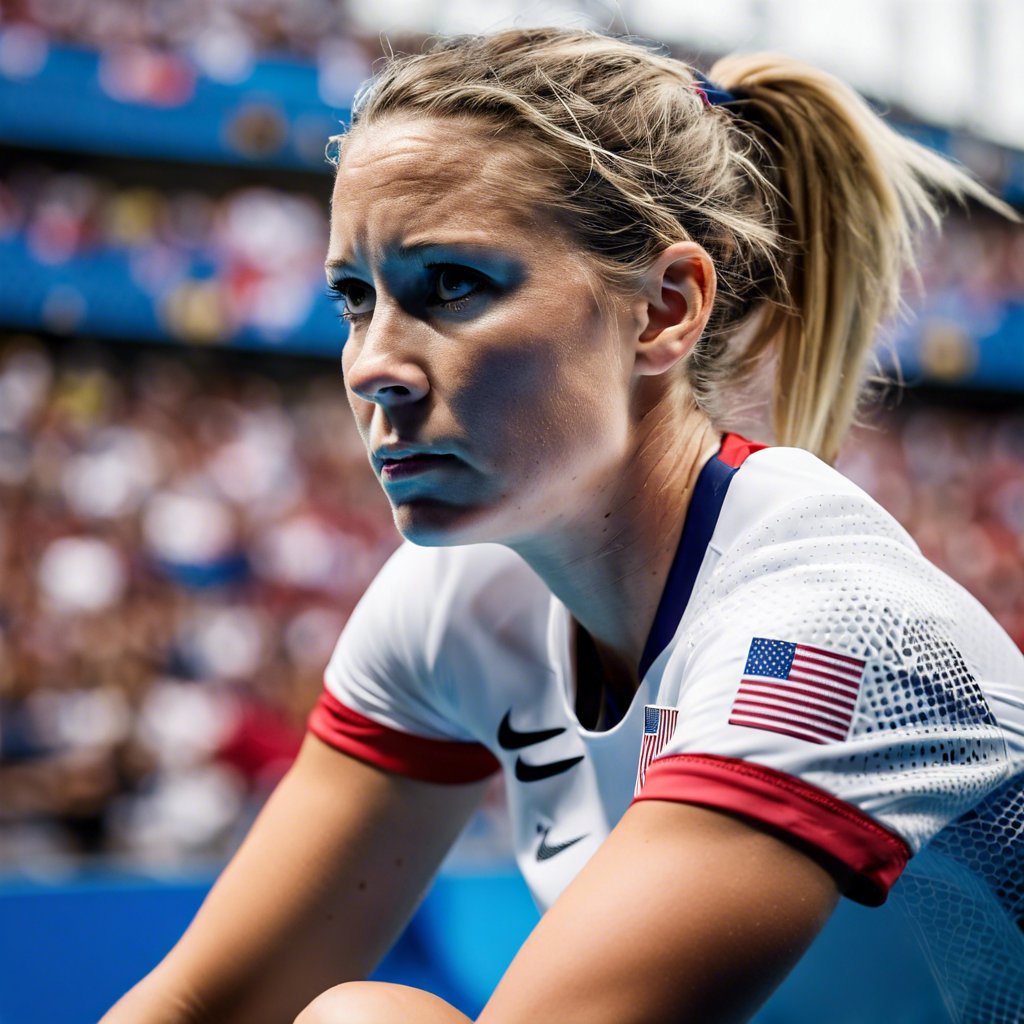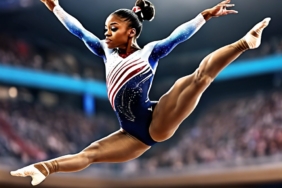The Thrilling Journey of the U.S. Women’s National Team
The best things often come in threes, and the U.S. women’s national soccer team’s front three exemplifies this perfectly. In the semifinal of the Olympic Games held on Tuesday, it was the talented Sophia Smith who netted the decisive goal. Collectively, Smith, Trinity Rodman, and Mallory Swanson have been pivotal, contributing to 10 of the team’s 11 goals throughout the tournament.
“Honestly, I don’t remember much of what just happened,” Smith shared with NBC after the match. “I recall Mal delivering a perfect through ball. I knew I had to rise to the occasion in this critical moment for our team.”
It has become increasingly evident that U.S. women’s national team head coach Emma Hayes is determined to maintain her chosen starting XI for as long as they remain competitive. Although there were some necessary rotations when defender Tierna Davidson returned from injury and midfielder Sam Coffey rejoined after a yellow card suspension, Davidson only played one half before being substituted for Emily Sonnett. Another key player, midfielder Rose Lavelle, exited in the 60th minute for forward Lynn Williams, possibly due to some foot or ankle discomfort sustained during a hard tackle in the quarterfinal against Japan.
Germany, too, appeared to struggle with freshness, which translated into a highly physical match filled with shoves and barges. Was this strategy designed to disrupt the U.S. rhythm? Or was it simply a byproduct of fatigue? Likely a mix of both. However, in the final minute of extra time, it was U.S. goalkeeper Alyssa Naeher’s remarkable kick save that secured victory for the team.
“We faced significant challenges last year,” Smith reflected. “I’m incredibly proud of our ability to find a way to win in these recent matches.”
Smith’s Extraordinary Performance
After 90 grueling minutes of a stalemate against Germany, Smith finally broke through, capitalizing on a beautifully timed through pass from Swanson. With an incredible burst of speed, she managed to connect with the ball, sending it into the goal just as German goalkeeper Ann-Katrin Berger advanced to claim it. This moment was reminiscent of Rodman’s game-winning goal in extra time against Japan, both showcasing an extraordinary depth of determination and skill that surpasses mere competitive spirit.
While every player on the field exhibits competitiveness, Smith, along with Swanson and Rodman, displayed an ability to draw on reserves of energy that seemed almost limitless. After the first 15 minutes of extra time, Smith was seen massaging her right thigh, wincing slightly, but her performance belied any discomfort. This was a true embodiment of the classic American ethos: “if we can’t outplay you, we’ll outlast you,” combined with the undeniable talent to actually outplay their opponents.
Naomi Girma: A Defensive Star
In a tournament that has predominantly highlighted the offensive prowess of three attackers, the semifinal showcased the brilliance of defender Naomi Girma at the pinnacle of her game. Following the absence of Becky Sauerbrunn for the 2023 Women’s World Cup, Girma has stepped up to lead the U.S. backline. Despite only debuting professionally in 2022, she commands the defensive third with a level of composure and excellence typically expected from a seasoned veteran.
Throughout the tournament, the U.S. has depended heavily on her capabilities, both on the ground and in the air, especially as her central defensive partner has alternated between Davidson and Sonnett due to injury concerns around the former. During Tuesday’s match, Girma showcased all the attributes of a modern center back. She skillfully carried the ball for 687 meters—24 percent of the entire U.S. women’s national team’s dribbling distance. Her distribution was exceptional, completing 125 passes from 132 attempts, far surpassing any other player on the field. Additionally, she created two chances for her teammates, trailing only Rodman and Swanson.
Defensively, Girma led the team in ball recoveries (13), clearances (5), and interceptions (3). The most astonishing aspect is that she turned 24 in June, suggesting that she could sustain or even elevate her performance level for another decade. As she continues to gain experience, it’s reasonable to expect her technical skills and decision-making to evolve further. It can no longer be contested whether she ranks among the world’s best defenders—her exceptional talent is undeniable, staking her claim as one of the finest players, regardless of position, globally.
Strategic Challenges for Coach Hayes
Since Emma Hayes took the helm in June, her rapid adaptation to international coaching has drawn attention, as teams around the globe are keen to learn how to counter her U.S. squad. Early in the Olympic sendoff friendlies, a pattern emerged: teams tended to adopt a defensive, bus-parking strategy to frustrate the United States, waiting for the opportunity to counterattack. While teams like Mexico and Costa Rica employed this tactic, it was less common in the Olympics, where competitive stakes are much higher.
Germany initially attempted a proactive style in the group stage but learned a harsh lesson, suffering a 4-1 defeat. Consequently, they had to rethink their strategy to reach the gold medal match. For 90 minutes, it appeared they might have succeeded by adopting a low-block shape that had thwarted the U.S. in previous matches, bolstering midfield presence with additional players in central areas.
The midfield has consistently been a weak point for the U.S. during these Olympics, as Lindsey Horan has struggled to make a significant impact. Although Coffey’s return from suspension helped stabilize the midfield, the U.S. still lacked depth in central positions. As Hayes’ defense continues to bend yet rarely break, the attack remains formidable. However, the midfield clearly requires refinement in the coming months. The team has not yet mastered navigating the central channel effectively, a process that demands time and practice—an element they lacked before entering these Games. Regardless of whether Spain or Brazil wins the second semifinal, it’s likely they will adopt a similar strategy to Germany, seeking control of the midfield against a fatigued U.S. team on Saturday.
A Showcase of Goalkeeping Excellence
This match served as a vivid illustration of the vital role of goalkeeping, featuring two exceptional talents: Berger and Naeher. Both were critical in maintaining a 0-0 scoreline throughout regulation, with Berger particularly standing out due to the U.S. team’s stronger attacking presence. Naeher also exhibited remarkable skill, demonstrating endurance and confidence as Germany attempted to seize momentum in extra time, notably leaping to claim a low cross with remarkable precision.
Berger recorded nine saves against 19 shots faced, while Naeher made seven saves against 15 shots. Berger dealt with 2.84 post-shot expected goals, reflecting the difficulty of the shots she faced, especially considering Smith’s numerous one-on-one opportunities. Without Berger’s efforts, the U.S. could have easily led by three goals.
On the opposite end, Naeher’s last-minute block to preserve the U.S. lead and avert penalties was nothing short of legendary. While Freigang’s header may not have been perfectly placed, Naeher’s instinctive play, where she made herself as big as possible, proved decisive. In replays, one can see her keenly tracking the ball and reacting almost instantaneously—this performance has become emblematic of her ability to shine in high-stakes tournaments. Tournament Naeher is a distinctly formidable presence, elevating her game to a level unmatched by any other stage of her career.
Looking Ahead for the USWNT
The United States now advances to its first Olympic women’s gold medal match since the 2012 London Games, where they will face the winner of the Brazil vs. Spain match.
Recommended Reading
- USWNT Achieving Olympic Success Without Alex Morgan: A Look at Her Impact Beyond the Field
- Emma Hayes’ ‘Driven’ Approach: Insights Into the USWNT Coach’s Commentary
- Analyzing the USWNT Olympic Roster for Paris 2024
(Top photo: John Todd/Getty Images)

















